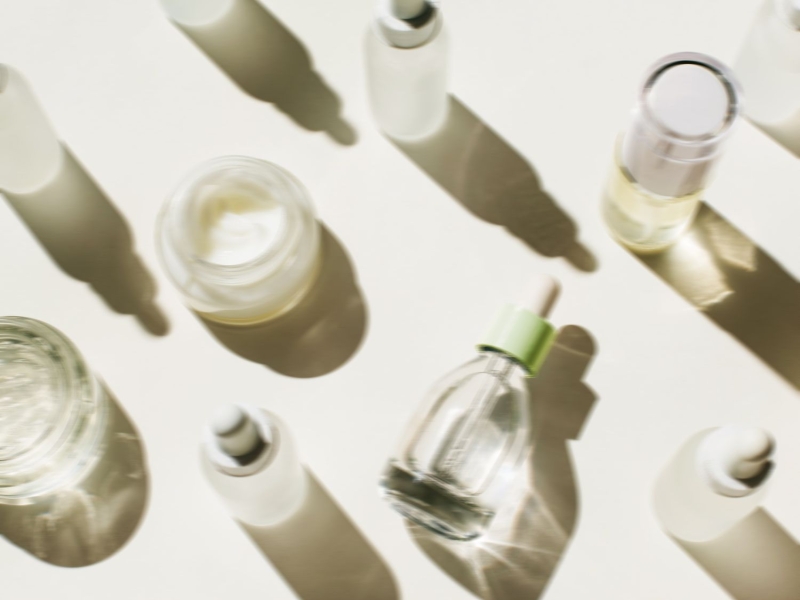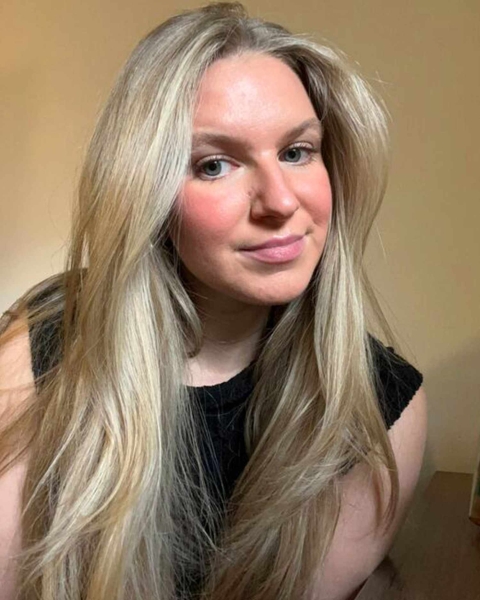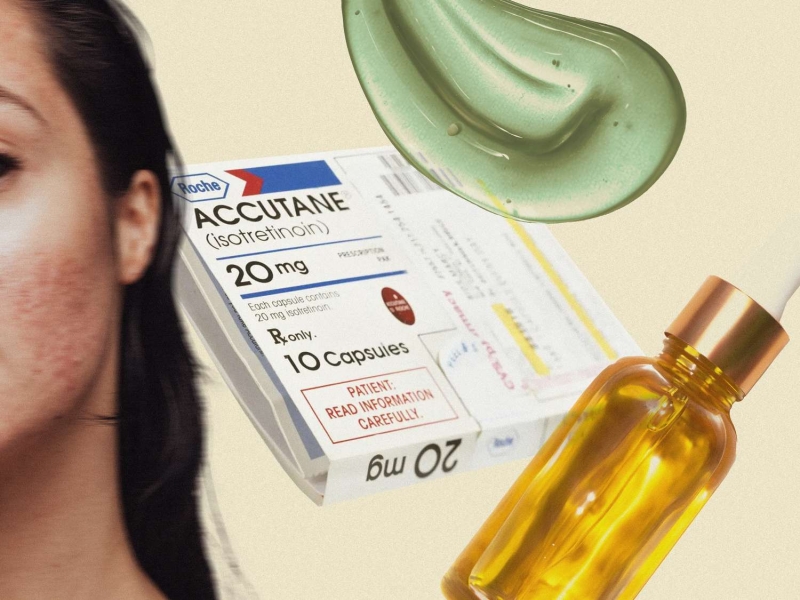In the age of #skinpositivity, we’re encouraged to embrace all our physical flaws, but what if I don’t want to?
There I am, ugly crying on the floor of my dorm room (Olivia Rodrigo “Good 4 U” style). It’s Halloween, and the throbbing pimple smack dab in the middle of my nose has stopped me from donning my Cat Woman costume. That is, until I remember I can hide behind my coordinating mask. I didn't remove the headpiece all night.
My junior prom was also nearly ruined by a cystic zit, one that gave me a headache and made me not want to pose for pictures. Perhaps the worst of them all were the hard, under-the-skin cysts that would sprout on my inner cheek and overstay their welcome by several weeks. A man at a makeup counter once told me my skin looked infected. Gee, thanks.
I’ve struggled with cystic acne since I was 14 years old and, sure, it seems obsessive to recall specific pimples from more than 10 years ago (or impressive, given the fact that I can’t remember what I had for lunch yesterday). But when your life becomes defined by your acne, zits start to serve as markers for major life events. And before you call me dramatic, tell me It isn’t as bad as you think, or say You could have much bigger problems (as I’ve heard many times before), put yourself in my pimple-ridden skin: Acne can be debilitating both physically and mentally, a fact that many people have a hard time understanding until they’ve experienced it themselves. When it was at its worst, my skin would control my life. I skipped class, canceled dates, avoided ordering a sandwich (certain hormonal chin and around-the-mouth pimples made it too painful to open my mouth wide), reapplied makeup hourly, and used the self check-out lane exclusively in order to steer clear of human interaction.
And no, my acne isn’t caused by poor skin hygiene. (The two are often unrelated — “Genetics and hormones [are] the two biggest contributing causes, so even if you are doing everything right from a diet and lifestyle perspective, you may still have acne,” says NYC-based dermatologist Hadley King, M.D.) Quite the opposite. In addition to a diligent daily cleansing routine that includes micellar water and gentle face wash, I have truly exhausted my treatment options: antibiotics, zinc and biotin supplements, Spironolactone, hormonal birth control, prescription topicals, spot treatments, monthly facials, chemical peels, and lasers. The lack of results really began to take a toll on my mental health. I constantly felt ugly, insignificant, less than, and unlovable. During my worst breakouts, I would become depressed and feel an existential sense of dread. It was all I could think about—Will it ever get better? Are people judging me? Do they dislike me because of my acne? I didn’t want to leave my house. It would trigger my diagnosed OCD, leading me to pick my skin until it was bleeding and bruised. According to studies, like this 2020 review conducted by American Academy of Dermatology, there’s a strong correlation between acne vulgaris (the medical term for the skin condition) and depression and anxiety.

“Acne can significantly impact an individual's mental health by contributing to feelings of self-consciousness and low self-esteem,” says New York-based neuropsychologist Dr. Sanam Hafeez, Psy.D. “The visible nature of acne may lead to social anxiety and a reluctance to engage in social activities, affecting interpersonal relationships.”
But it’s not just social stress; aggressively treating your acne with no success is both infuriating and frustrating — the definition of insanity is doing the same thing over and over and hoping for different results. “The inflammation associated with acne can activate the body's stress response, increasing stress hormones like cortisol, which can affect mood and mental well-being,” explains Dr. Hafeez. “Acne-related pain and discomfort can cause irritability and frustration, influencing mood and overall emotional state.” Plus, when you stress out about your pimples you get even more — convenient, right?
The good news is social media has become increasingly more honest and raw. Instead of only seeing perfectly curated, color-coordinated pages, we’ve shifted to humorous photo dumps filled with candid content and Gen Z–approved blurriness. That shift in tone and increase in makeup-free and unretouched selfies has normalized imperfections, including skin conditions, thanks in large part to influencers and celebrities like Alix Earle, Keke Palmer, Izzie Rodgers, and Lavinia Rusanda, who post unfiltered content that shows off both their bare and glammed skin, all while discussing the effect acne has had on them. Rodgers and Rusanda prove that you don’t need to have crystal-clear skin to try out viral makeup trends, and Palmer gives in-depth tutorials on covering blemishes with hilarious commentary. Plus, everytime Alix posts a GWRM on TikTok, she reminds her followers that acne is normal.
“[Acne] doesn't take away from your overall beauty. It's a journey and sometimes it gets worse before it gets better,” Earle tells InStyle. “It's going to ebb and flow, but overall it is a normal thing that a lot of people deal with.” Case in point: The hashtag behind the skin positivity movement has nearly a billion views on TikTok, indicating just how common it is.
#Skinpositivity has helped millions of people, including myself, to feel less alone and ashamed of their acne-prone skin. (If Keke Palmer can have acne and still be mother, then so can I.) I love the direction in which BeautyTok is moving, finally giving real skin representation. I love seeing other women talk openly about struggles that many of us face. And, I love the de-stigmatization of skin conditions.
And yet… I don’t want to celebrate my acne. There — I said it.
I’m tired of the underlying message that comes with any online inclusivity campaign: That we all must be happy with and proud of everything about our physical selves, no questions asked. That if I don’t embrace my skin texture/inflammation/wrinkles/body fat/cellulite, then I am part of the problem. That’s B.S. Acne isn’t just a superficial condition, and my disdain for my pimples does not make me shallow or vain. It’s more than skin-deep. According to Dr. King, treating acne and reaching our skin goals can come with a slew of benefits, including an “increase [in] self esteem, confidence, and an improved self image.” I want clear skin for my own sanity, happiness, and mental well-being. Is that too much to ask?
Acne isn’t just a superficial condition, and my disdain for my pimples does not make me shallow or vain. It’s more than skin-deep.
“Acne, unfortunately, is normal and largely out of our control — and it does not define who we are,” Dr. King adds. “Pairing this with the empowerment that comes from having accessible high-quality otc [over-the-counter] acne-fighting products feels important, so that people don't have to feel powerless and victimized by their acne. Embrace your face and understand your acne and what your treatment options are.”
Clearing your skin, Dr. Hafeez notes, can even prevent bigger issues, like bacterial infections (for my fellow pickers). In terms of mental health, “Clear skin can alleviate these psychological burdens, promoting well-being and mental peace,” she adds.
Everyone’s journey with skin care is different, and that’s okay. For me, right now, my journey includes taking the controversial prescription drug Isotretinoin (a.k.a. Accutane, the holy grail of treating acne). It famously comes with a whole list of side effects — dry lips, dry skin, dry eyes, bloody noses, possible depression, birth defects, and more — so it’s not the best option for everyone. Because my skin has had such an acute impact on my mental well-being, I decided that the medication was worth it for me, regardless of the drug’s reputation or my family’s hesitations. Dr. King says it can be a game-changer for many people who suffer from severe acne, however, she strongly urges patients to be “screened appropriately” before committing. If you are interested in taking the drug, find a trusted dermatologist who can properly educate you on Isotretinoin and monitor you closely while completing the treatment.

“I have seen so many patients benefit immensely from it, and often after being very frustrated that they were not getting sufficient improvement from other acne treatments,” Dr. Hadley says. “It is really a remarkable drug and the closest thing we have to a cure for acne, and the vast majority of patients who take it tolerate it very well without any significant adverse effects.”
I’m not here to persuade you to feel a certain way about your skin. If your bumps, texture, and beauty marks make you feel unique and beautiful, you should absolutely embrace these qualities. On the other hand, if blemishes and zits make you feel like shit, then there are tons of resources to help you tackle your acne head on (literally). You don’t have to feel ashamed of either option, because isn’t that what skin positivity is all about? Dr. Hafeez defines it as “accepting all skin types, regardless of imperfections or conditions,” while also “challenging conventional beauty standards that often prioritize flawless and unattainable skin, instead embracing diversity and encouraging people to feel comfortable in their skin.” Earle adds that she believes “confidence and being positive about yourself has to start with you.” Me and my soon-to-be-clear-skin couldn’t agree more.
